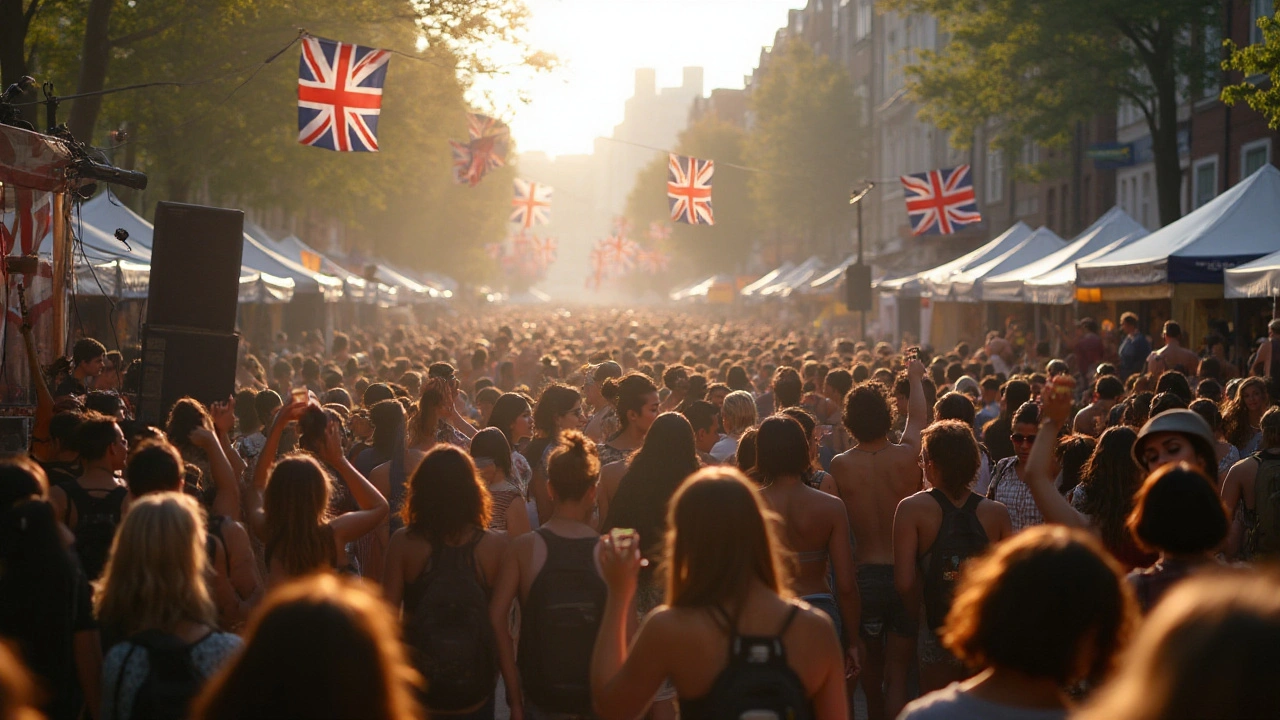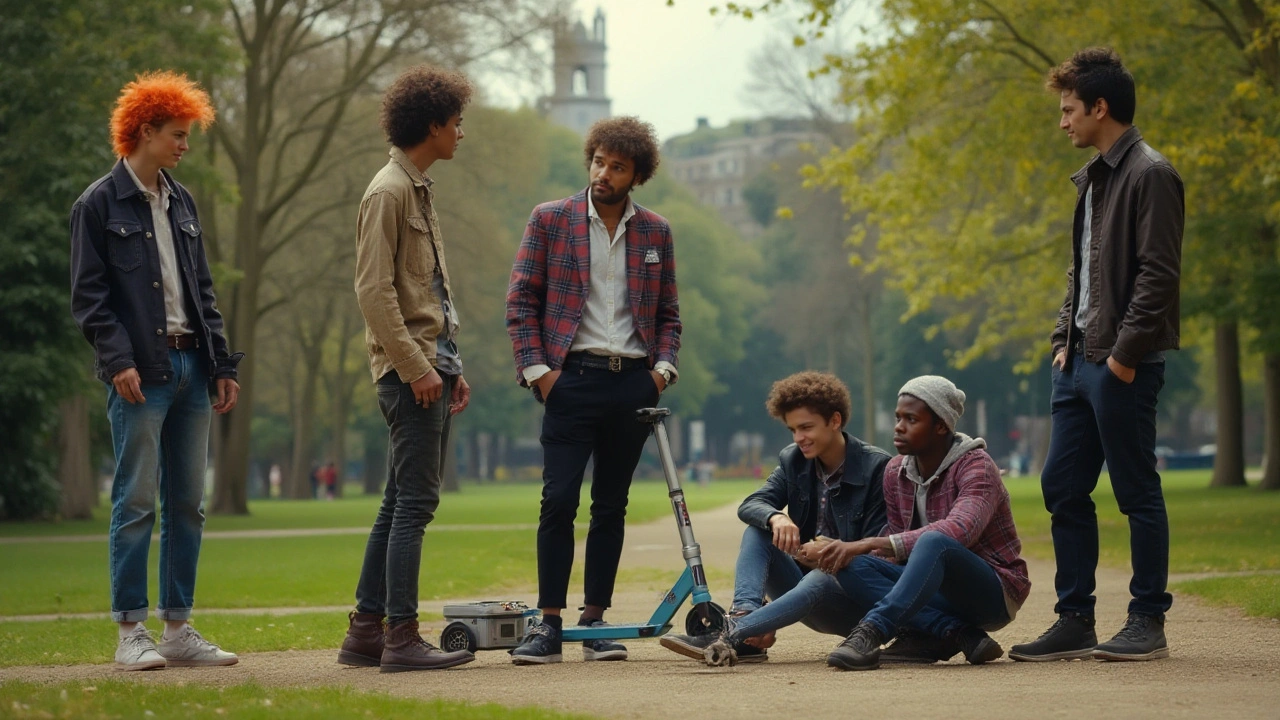Music genres are more than just collections of sounds and rhythms; they are powerful catalysts that shape and define popular culture. Every style of music tells a story, painting pictures in melodies and lyrics that resonate with the human experience. From the roaring anthems of rock and roll to the poetic flows of hip-hop, these genres impact our lifestyle choices, our ways of communicating, and even our values.
Think of the way rock and roll stormed onto the scene, bringing with it not just music, but new fashions, rebellious attitudes, and an entirely unforeseen youthful voice. Similarly, hip-hop emerged from the streets to tell the stories of those often unheard, shaping cultural dialogue and influencing language worldwide. Every chord strummed and beat dropped is part of an ongoing symphony that molds the societies we live in today.
- The Historical Roots of Music Genres
- The Influence of Rock and Roll
- Hip-Hop's Role in Shaping Cultural Narratives
- Pop Music and its Global Impact
- Music Genres as Catalysts for Social Change
The Historical Roots of Music Genres
Music as a form of expression is as old as humankind itself, evolving alongside civilizations to reflect the nuanced complexities of each era. The concept of music genres began to form when societies started to identify distinctive styles and traditions in their musical endeavors. In ancient times, the earliest recognizable genres likely arose from basic human needs like communication and ritualistic practices, often tied to religious or cultural ceremonies. For instance, the spiritual chants sung by indigenous tribes around the globe were some of the first to illustrate the power of music as a cultural pillar. As societies grew, so did the complexity and variety of these musical styles.
During the Renaissance period, music was categorized into sacred and secular styles, giving rise to genres like Gregorian chants and motets on one hand, and folk and dance music on the other. This era saw composers exploring new realms of music theory, laying the foundations for future genres like classical music. A distinct shift occurred during the Baroque period, with the genesis of identifiable styles such as the concerto and sonata, led by maestros like Bach and Vivaldi, who crafted works that defined the era’s soundscapes. It was in this period that music started to be seen not only as art but also as entertainment, highlighting its potential to influence culture.
As we moved into the 19th century, the emergence of the industrial world and increased global connectivity birthed even more music genres. Jazz, an innovative genre stemmed from the African-American communities of New Orleans, combined elements of African rhythms, European harmonic structure, and blues. It revolutionized music with improvisation and rhythmic complexity, echoing the socio-political changes of the time. This genre was a trailblazer for modern music, inspiring countless movements worldwide. A prominent artist of the jazz age, Louis Armstrong, once said,
"Jazz is what I play for a living."His words encapsulate how deeply interwoven jazz became with personal and cultural identity.
The 20th century saw the explosion of music into many recognizable music genres like rock, pop, and hip-hop, each carrying its cultural significance. Rock and roll emerged in the 1950s, fueled by the electric guitar’s power and strong vocal performances, quickly becoming synonymous with youthful rebellion and social change. Fast forward a few decades, and hip-hop surfaced from the streets of New York, bringing voice to the struggles and triumphs of urban life. This era also signifies a point where music began to not only reflect cultural changes but actively instigate them, bridging communities and inspiring social movements. Music genres, therefore, became not just expressions of art but vital components of cultural identity.
The Influence of Rock and Roll
Rock and roll isn't just a music genre; it's a cultural powerhouse that reshaped societal norms and conventions during the 20th century. Emerging in the 1950s, it quickly became synonymous with rebellion, youth, and an entirely fresh outlook on life. This music genre fanned the flames of change, affecting everything from fashion to political movements. Artists like Elvis Presley, Chuck Berry, and Little Richard weren't merely musicians, they were trailblazers who brought a powerful, rhythmic persuasion into the living rooms of a conservative society, challenging perspectives and inspiring a new attitude toward individual freedom.
One of the most significant impacts of rock and roll was its ability to act as a social equalizer. It broke racial barriers by blending black rhythm and blues with white country music, creating a sound that appealed to diverse audiences. The influence of iconic albums and shows, paired with energetic performances, echoed through cultural spheres, sparking dialogues that questioned racial segregation and promoted equality. It's no surprise that the Civil Rights Movement found in rock and roll an effective partner and mouthpiece. In fact, Martin Luther King Jr. once remarked how the genre had "helped to revolutionize the aspects of American culture and social change."
The genre's influence didn't just stop at social issues; fashion felt its reverberations too. Rock and roll revolutionized the way people dressed, encouraging them to break free from societal expectations and embrace individuality. Leather jackets, denim jeans, and untamed hairstyles became more than just outfits—they were symbols of the counterculture, of breaking away from the norm to establish self-identity. The aesthetic was as much a part of the beat as the music itself. What began on stage as shockingly unconventional soon found its place in mainstream wardrobes worldwide.
In terms of economic impact, rock and roll was a catalyst for a lucrative industry. The rise of record sales, concert tours, and band merchandise generated millions of dollars, transforming music into a significant sector of the economy. The Beatles, for instance, not only set music records but also opened doors for the British invasion, which brought a wave of UK bands into American consciousness, forever changing the musical landscape and international collaborations. Their success marked a global outreach, transcending geographical boundaries and establishing the music industry as a global entity.
Even today, the echoes of rock and roll influence the modern music scene. Bands and artists continue to draw on its rebellious spirit and dynamic approach to self-expression. From alternative rock to punk and indie genres, the core elements of rock and roll never really vanished; they evolved. Many contemporary musicians cite classic rock artists as key inspirations, proving the genre's profound impact on their creative life and output. With its energetic beats and defiance of norms, rock and roll has solidified its place as a pillar of popular culture, influencing countless aspects of daily life and creative expression. As John Lennon famously said, "If you tried to give rock and roll another name, you might call it 'Chuck Berry.'"

Hip-Hop's Role in Shaping Cultural Narratives
Hip-hop is more than a music genre; it's a cultural movement that has dramatically reshaped the narratives of our time. Emerging from the streets of the Bronx in the 1970s, hip-hop gave a voice to communities that were often overlooked and underrepresented. It provided a platform for storytelling that captured the raw, unfiltered experiences of life in urban America. With its roots deeply embedded in the struggle for social justice, hip-hop has always been a space for dialogue about race, class, and power dynamics.
As it grew in popularity, hip-hop began to influence countless aspects of popular culture, from fashion and language to politics and education. It showed the world the power of self-expression and inspired generations to challenge the status quo. Artists like Tupac Shakur and The Notorious B.I.G. used their music to delve into the harsh realities of street life, commanding the attention of audiences around the globe. Their lyrics spoke of the hope and despair of their communities, turning personal experiences into universally resonant stories.
"Rap is a kind of music that’s like journalism—we are reporting what is happening in our communities, with an authenticity other media can’t always provide." — Nas, a renowned hip-hop artist
The influence of hip-hop extends far beyond music charts. It has become a powerful tool for education, with programs emerging that use rap to engage students in learning. This innovative approach has made history and literature more relatable to students who might otherwise feel disconnected. Hip-hop has also played a significant role in the political arena. Artists like Kendrick Lamar and Childish Gambino weave socially conscious themes into their music, bringing attention to issues like police brutality and systemic racism, sparking important conversations and actions worldwide.
Furthermore, the genre's reach has influenced global culture, breaking barriers and blending with local musical traditions. International artists have taken hip-hop and infused it with their cultural nuances, creating diverse and rich sounds that are embraced worldwide. This global adoption underscores how hip-hop transcends language and geography, proving it is a universal form of expression.
By examining the evolution and impact of hip-hop, we understand how it forms an integral cornerstone of modern culture. Its capacity to foster social change, empower marginalized voices, and unite people across divides is undeniable. Hip-hop continues to evolve, shaping and being shaped by the cultural narratives of our times, leaving an indelible mark on the world.
Pop Music and its Global Impact
Pop music, with its catchy hooks and widespread appeal, has become a monumental force in shaping the modern cultural landscape worldwide. Originating as a genre meant for the masses, it has evolved into a cross-cultural phenomenon that transcends geographical borders. The infectious melodies of pop songs have a knack for embedding themselves into daily life, often becoming anthems for celebrations and solace in moments of solitude. Artists like Madonna, Michael Jackson, and more recently, Taylor Swift and BTS have each, in their own way, pushed pop music into new realms, creating music that resonates universally.
The influence of pop music can be observed in a multitude of spheres, from fashion to technology, language to lifestyle. Worldwide, you will find pop music dictating the ebb and flow of trends within the fashion industry, as styles worn by pop icons become the desired attire of millions. This genre often mirrors societal changes, with its lyrics reflecting the hopes, dreams, and frustrations of entire generations. Pop songs have an uncanny ability to speak to the common experiences of humanity, regardless of the listener’s native tongue or cultural background.
"Pop music is a reflection of the universal joy and pain that tie us together. Its sound is forever changing, yet its essence remains relatable." – Unknown Music ScholarThe role pop music plays is anchored by its widespread accessibility. The advent of digital streaming services has removed many of the barriers that previously restricted global access to music. Tracks can be discovered and shared with unprecedented ease, leading to the meteoric rise of artists from every corner of the planet. During the 2020s, platforms like Spotify and YouTube have been pivotal in the global dissemination of pop music, leading to a more interconnected world through shared musical experiences. For instance, South Korean acts have redefined what it means to be an international star, proving that music truly is a universal language.
Pop Music's Role in Societal Conversations
Perhaps most significantly, pop music often serves as a platform for societal dialogues, leading to increased awareness and societal change. Whether tackling issues such as climate change, mental health awareness, or advocating for social justice, pop music has the ability to bring these conversations to the forefront. Songs have acted as rallying cries for the oppressed and as sources of comfort, offering solace to those seeking an escape from the harsh realities of life. The power of pop is not just in its melody, but in its ability to unify and engage listeners in meaningful discourse, creating a shared culture and narrative that spans continents.
In today's era, pop has come to symbolize a more interconnected and understanding world. Its power lies in simplicity, providing a platform for universal storytelling through rhythm and verse. The modern pop scene continues to shape and be shaped by the world around it, making it an ever-present force in the journey of human culture. With its feet firmly planted in the now and its eyes on the future, pop music continues to shine brightly as a beacon of modern popular culture.

Music Genres as Catalysts for Social Change
Music genres have long served as potent tools for social change, acting as beacons of hope, platforms for dissent, and vehicles for storytelling. Across history, many music genres have emerged as transformative forces, breaking barriers and fostering dialogue. They bridge divides, create communities, and inspire movements. The influence of music genres on societal transformation can be traced to various movements where songs became anthems, uniting people for a cause.
One of the most poignant examples lies within the socially conscious messages of folk music during the 1960s civil rights era. Artists like Bob Dylan and Joan Baez penned songs that transcended entertainment, urging listeners to reflect on humanity and justice. This genre's simplicity in melody coupled with profound lyrics tapped into the zeitgeist, inspiring collective action. Similarly, the reggae music of Bob Marley carried messages of freedom, unity, and resilience, becoming synonymous with the fight against oppression globally. It was not just a soundtrack but a rallying cry.
As time progressed, hip-hop emerged from the streets as both an art form and an act of defiance. It gave voice to marginalized communities, expressing their struggles, aspirations, and resilience. Songs often act as journalistic reports, shedding light on economic, social, and political issues. A quote by rapper and activist Chuck D of Public Enemy highlights this sentiment, where he once referred to rap as "the CNN of the black community," emphasizing its role in dispersing uncensored narratives and truths.
Rock and roll, with its rebellious spirit, also played a significant role in this realm. By challenging the status quo, it encouraged generations to push boundaries. Its evolution through punk rock and beyond carried messages of anti-establishment, questioning societal norms and advocating for change. Musicians used their platform to declare new freedoms and rights, enacting social evolution through amplified chords and relentless beats.
Even today, the impact of music genres in advocating social change is palpable. Pop music artists use their reach to raise awareness and funds for causes worldwide, reflecting on global issues like climate change, equality, and mental health. As music continues to evolve, its role as a catalyst for conversations, a bridge for understanding, and a motivator for action persists strongly. The intersection of melody and message remains a powerful tool, capable of altering the fabric of society and guiding us towards a more equitable future.

